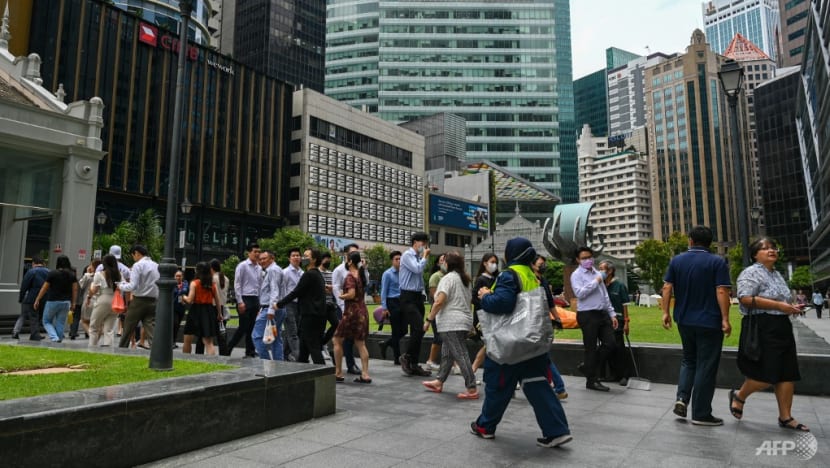Commentary: Singapore residents must save for retirement today to continue enjoying low income taxes
For direct taxes to remain low, Singapore workers need to do more with their money to prepare for their future retirement, says David Kuo of The Smart Investor.

Office workers walk out for a lunch break in Singapore's Raffles Place business district on Oct 6, 2022. (File photo: AFP/Roslan Rahman)
SINGAPORE: The message from the Budget 2023 speech could not have been clearer. It cannot be business as usual for Singapore.
Over the last couple of decades, the country has benefited from global trade and finance flows. But with increased patriotism, protectionism and nationalism swirling around the world, Singapore will have to work even harder to maintain its competitiveness.
As the economy matures, retirement is an area that we should pay attention to. By 2030, which is just seven short years away, one in four Singaporeans will be aged 65 or above, up from one in five.
Budget 2023 offers targeted support to Singapore’s growing pool of seniors. The ElderCare fund will be topped up by S$500 million, and another S$1.5 billion will be added to the MediFund.
But just think about that for a moment. Singapore expects a Budget deficit of S$2 billion in the financial year (FY) of 2022, and a deficit of S$400 million in FY2023. Those deficits would be almost erased if not for the subsidies provided to the elderly.
LISTEN - Heart of the Matter: Will Budget 2023 bring about a further rebalancing of Singapore society?
That is another way of saying that there are no free lunches. If we want direct taxes to remain low, then we must be prepared to make provisions for our retirement, so we won’t need government subsidies.
ENSURING OUR RETIREMENT ADEQUACY
As Singapore studies how else it can help seniors in community settings, there is plenty that Singapore workers can do for themselves now.
While the Government has kept the rate of contributions to the Central Provident Fund (CPF) unchanged, it will raise the monthly salary ceiling from S$6,000 to S$8,000 to reflect the rise in wages as a result of inflation.
But this alone may not be enough for an ideal retirement for some individuals. If so, they will need to do more with their money to enjoy their twilight years.
Perhaps the single most important question we need to ask ourselves is how much money we realistically need to retire. This number varies greatly based on your needs and lifestyle. A 2019 Lee Kuan Yew School of Public Policy study estimated that the minimum amount a senior needs for a basic standard of living in Singapore is about S$1,400 a month.
But considering that the median income per household member in Singapore is about S$3,200 a month, which adds up to S$38,400 per year, let’s work off a round figure of S$50,000 as the amount needed each retirement year. You can scale this up or down accordingly, but don’t forget to factor in inflation.
At an annual inflation rate of, say, 3 per cent, our S$50,000 target would be equivalent to S$100,000 in around 24 years’ time. And in 48 years’ time, it would need to be as much as $200,000.
That, by the way, is not how much money we would need to have in our retirement pot. That is the income we would need to generate from our savings. Because we don’t know how long we will live, we do not want to draw down the pot and run the risk of exhausting it.
Taking into account the 4 per cent floor interest rate of the CPF Special Account, the nest egg required to generate an annual income of S$100,000 a year in 24 years’ time is S$2.5 million. We should ask ourselves if our accumulated CPF contributions earning 2.5 per cent interest a year will be able to grow sufficiently to reach that target.
If it is unlikely, we should invest some of our money into assets that can outpace the rate of rising prices. That generally means investing in shares.
There is a limit as to how much our CPF money can be invested in the stock market. So, we may need to look beyond compulsory contributions and build another pot of money outside of CPF. The best time to do that is while we are young.
INDIRECT TAXES PREVAIL OVER DIRECT TAXES
Budget 2023 also highlighted the Government’s commitment to low personal income tax with indirect taxes taking the brunt. Stamp duties on high-end properties will rise. So too will taxes on luxury cars.
We can argue about the benefits of indirect taxes versus direct taxes. In the case of the former, we pay taxes as we spend. In the case of the latter, the decision to spend is taken away from us through taxation.
However, taxes on expensive cars and properties are unlikely to affect the mass affluent.
The upshot is that raising taxes on these items can be a good way for the Government to redistribute wealth. After all, that is one of the main reasons why we pay taxes. It is a means by which some wealth from those can afford it can be transferred to those who need it.
SETTING ASIDE MONEY FOR THE NEXT CRISIS
There was another important message in the Budget. While the pandemic has been funded by a necessary deficit, budgets must always be balanced over a business cycle.
Though Singapore will not draw on its reserves in this year’s Budget, past deficits must eventually be replaced by future surpluses. What’s more, Singapore must continue to consciously build up its reserves to prepare for the next crisis.
We need to do the same too. The Government has provided Singaporeans with the means to cope with inflationary pressures through voucher schemes. This should help ease some of the pain when we do our daily shopping.
More importantly, it buys us time to set aside some money for a rainy day because wages are rising but income tax rates aren’t.
It is a window of opportunity that other developed economies have been unable to provide. But we need to fix our roofs when the sun is shining. It will be too late when thunderstorms hit.
In summary, Budget 2023 puts households firmly in the driving seat. The Government is treating people as mature adults in a maturing economy. The country’s finances are strong and should be even stronger over time.
We too can make our household finances stronger over time by being prudent with our spending and preparing for future uncertainties. If we want our taxes to remain low, we need to do our part to ensure that it stays that way.
David Kuo is Co-founder of The Smart Investor.



















